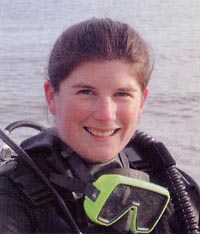Seasearch takes off!
I'm sure many people look at the water and often think of it as being cold, dark and uninteresting -surely nothing of much interest lives down there. Well, they'd be very wrong. The seas around Cornwall are some of the most diverse in the country due to the mixing of cold northern and warm southern currents. There's a wealth of marine life lurking below the waves, from the smallest anemone to the brightest fish.
Having said that, we still have huge gaps in our knowledge of
exactly what habitats and species occur where. Marine habitats and the life that exists in different areas, from rocky reefs to submerged sandbanks, are under threat from a whole range of man's activities including pollution, aggregate extraction, development, over-fishing and even global warming. If we are to protect our marine environment we need a much better idea of where the special and most vulnerable areas are, so we can begin to manage them accordingly. This is where Seasearch comes in.
Seasearch is a volunteer underwater seabed surveying project for recreational divers. It was established in the 1980s by the Marine Conservation Society and the Nature Conservancy Council, but following a recent re-vamp and re-launch nationally, Cornwall Wildlife Trust has taken on the role of co-ordinating the project in Cornwall. We want divers to help us by telling us what they see on their dives so we can start to build up a picture of what marine
habitats and sealife exist in which places. We can then use that information to protect areas from the many varied threats they face.
There are two main levels to the project. Seasearch Observer is the beginner's level and simply asks you to tell us what type of seabed habitat you see, for example whether it's kelp forest or a barren sandy bottom, as well as a short list of important species to look out for. The next level is Seasearch Surveyor, which goes into a bit more detail and requires some experience of marine recording.
We will be starting the project this year with the Observer course, which entails a one-day workshop where you will learn how to identify certain habitats and species, and how to fill in the survey forms. There's even a 'virtual dive' on video where you are guided on what to look out for without having to get wet! We will also be organising Seasearch dives throughout the year with various clubs, to practise our survey techniques.
The end aim is for recreational divers to be able to fill in a survey form for every dive they do, wherever and whenever it is. The data collected will be collated through the Environmental Records Centre for Cornwall and Isles of Scilly and will be used to highlight any problems, raise awareness and direct future work. Possibilities include helping to locate and monitor fishing No Take Zones, or designating new Marine Reserves, as well as management of specific issues
Seasearch can be done by anyone who dives, as long as you have a minimum qualification of BSAC Sports Diver/PADI Advanced Open Water or equivalent, third party dive insurance, a valid medical certificate and your own dive equipment. Forget those wrecks, start looking around at the beauty of the underwater world and take an active part in conserving it for the future!
We will be running training workshops throughout the year and hope to build up a network of enthusiastic divers to monitor the sealife found around the county.
If you are interested in finding out more about Seasearch, getting involved, or anything else to do with marine conservation in Cornwall, please contact me on (01872)245520.
Ruth Williams
Marine Conservation Officer
 Ruth Williams. Photo: Jeremy Williams
Ruth Williams. Photo: Jeremy Williams